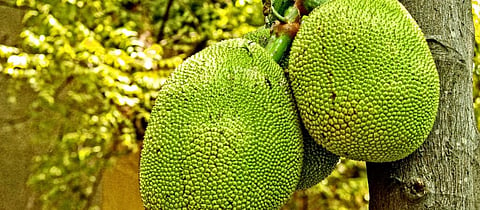How COVID-19 has jammed South India’s jackfruit economy
Jackfruit, along with mango and banana, is one of the three primary horticultural crops in Tamil Nadu and parts of Kerala.
Due to the nationwide lockdown in the wake of the novel coronavirus disease (COVID-19) pandemic, millions of jackfruits are yet to be picked up from trees, causing huge losses to farmers and seasonal contractors.
COVID-19 is a nightmare to agriculture in general and horticultural products in particular. While jackfruits are cultivated commercially in Tamil Nadu’s Cuddalore, Pudukottai, Dindigul and Thanjavur districts, they are grown in backyards in Kerala for domestic use.
In Karnataka’s Tumakuru and Hassan districts, farmers raise jackfruits in so-called strip plantations, where a field is partitioned into long, narrow strips which are alternated in a crop rotation system.
The jackfruit tree flowers during December-January and is ready for harvest in March-April as a summer fruit.
Farmers in Tamil Nadu grow jackfruit in more than 30,000 acres of orchards; as intercrop with mango, gooseberry, cashew and sapota and in strip plantation on dryland field bunds.
Within a couple of months of flowering, famers cut a few fruits and sell them to be used for making curry. Healthy fruit grows in size and is ready for harvest after four months.
Realising the economic significance of this crop, many farmers borrowed and invested to grow it in large orchards in Alangulam and Aranthangi taluks in Pudukottai, Pandruti taluk in Cuddalore, Sirumalai hills in Dindigul district and Orathanadu taluk in Thanjavur.
Red, sandy soil, with moderate humidity, is ideal for growing this crop without much water and chemicals and the fruits grown in these areas are tasty.
In 2018, cyclone Gaja devastated Thanjavur, Dindigul and Pudukottai districts and uprooted and spoiled jackfruit trees which caused heavy losses to the farmers.
Due to normal rainfall and favorable climatic conditions in 2019, jackfruit trees yielded well and farmers were happy.
But then came COVID-19
Besides farmers, petty traders also make a quick buck during the jackfruit season in crowded places like bus stands, railway stations and regular large market yards.
Now, these places are shut. Only head loaders and push cart sellers are selling on bare minimum scale in local temporary market yards.
During normal years, mounds of jackfruits welcome travelers on both sides of the busy Chennai-Kanyakumari national highway from Villuppuram to Thiruchirappalli and farmers, petty traders and contractors do good business.
Contractors normally pay advance after assessing whether the tree is flowering. This year, they paid crores of rupees as advance expecting a good harvest.
Unfortunately, they have been unable to harvest, process and supply to major markets like Bengaluru, Chennai, Delhi, Hyderabad and Mumbai. The demand for jackfruits is around 100 tonnes every day during peak season and the total turnover is around Rs 150 crore.
Shortage of labour for harvesting, grading, loading and restriction on truck movements have affected the business. Now, contractors are in for huge losses as the advance cannot be taken back from farmers. This is because it was an informal agreement based on mutual trust.
Farmers have already spent the advance amount for cleaning the gardens, fencing, pruning the trees and intercultural operations including removing weeds and thorny bushes to pave for a smooth harvest and transportation of the fruits.
Resource-poor marginal and small farmers are unable to pay the advance while some large farmers are willing to adjust a partial amount during the next crop season.
In normal years, mini trucks go close to the gardens, transport the produce to major collecting points from where, large-sized vehicles transport it to distant places of other states. The drivers have now been rendered jobless.
Local labourers, who are experts in identifying ripened fruits and harvesting fruits without causing damage to others, have also been rendered jobless.
Ripened fruits are rotting and seeds are sprouting in the trees, causing anxiety among farmers. They believe that agricultural products should be harvested. Else, next year, the gods will punish them with a reduction in flowering and production.
Hence, small farmers, who have not entertained seasonal contractors, are harvesting the fruits and feeding them to animals. They have also admitted that a loss in income is going to affect their spending on children’s education and other domestic needs including repayment of loans.
Value addition to this crop is limited as not much technology has been developed. In fact, jackfruit chips are famous in Kerala and making curry from tender fruit and seeds is common in Tamil Nadu.
Jack fruits are used for making prasadam in Hindu temples, especially the Palani Murugan hill temple in Dindigul district. This year, this will be affected due to the lockdown.
Farmers and contractors suggest that technology for value addition for jackfruit may be developed by Indian Institute of Crop Processing and Technology, a central government research centre located on the Thanjavur-Pudukottai road.
S Rajendran is Professor and Head, Department of Economics, The Gandhigram Rural Institute, Gandhigram, Dindigul District, Tamil Nadu


